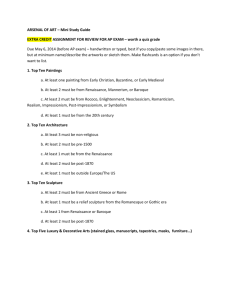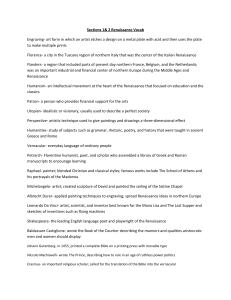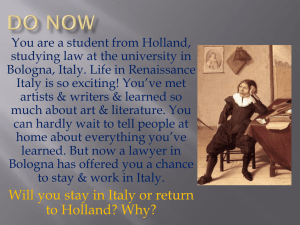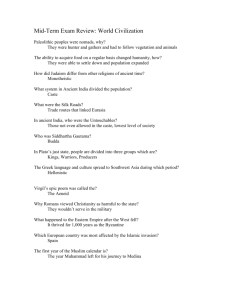Renaissance Philosophy
advertisement
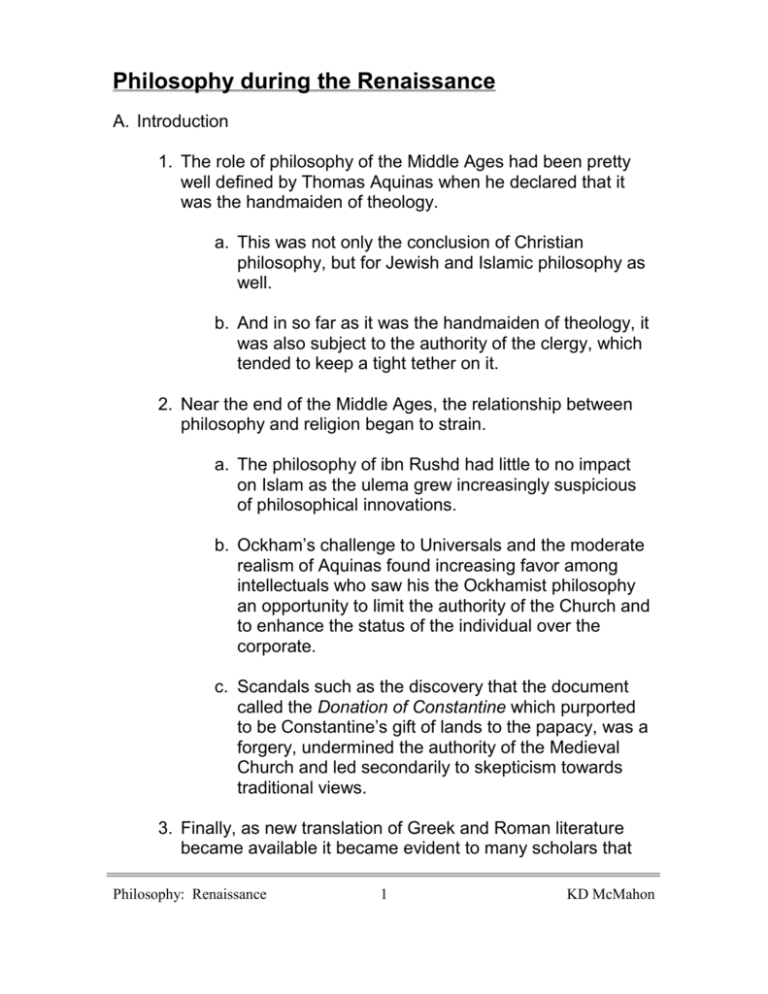
Philosophy during the Renaissance A. Introduction 1. The role of philosophy of the Middle Ages had been pretty well defined by Thomas Aquinas when he declared that it was the handmaiden of theology. a. This was not only the conclusion of Christian philosophy, but for Jewish and Islamic philosophy as well. b. And in so far as it was the handmaiden of theology, it was also subject to the authority of the clergy, which tended to keep a tight tether on it. 2. Near the end of the Middle Ages, the relationship between philosophy and religion began to strain. a. The philosophy of ibn Rushd had little to no impact on Islam as the ulema grew increasingly suspicious of philosophical innovations. b. Ockham’s challenge to Universals and the moderate realism of Aquinas found increasing favor among intellectuals who saw his the Ockhamist philosophy an opportunity to limit the authority of the Church and to enhance the status of the individual over the corporate. c. Scandals such as the discovery that the document called the Donation of Constantine which purported to be Constantine’s gift of lands to the papacy, was a forgery, undermined the authority of the Medieval Church and led secondarily to skepticism towards traditional views. 3. Finally, as new translation of Greek and Roman literature became available it became evident to many scholars that Philosophy: Renaissance 1 KD McMahon the Medieval interpretations were not the only ones possible. Not only were new translations of Plato and Aristotle available, but also people were introduced to Epicureanism, Stoicism, and Skepticism. 4. A new form of philosophy began to emerge during the “rebirth” (Renaissance), that is, humanism. Humanity and human society could be the object philosophical inquiry independent of religion and religious presuppositions. a. The Renaissance was not necessarily hostile to religion, but its approach was different. b. This difference is evident in its art. Depictions of human form (even saints) were drawn and sculptured known three dimensionally by artists with an understanding of human anatomy. Such as approach would have been considered irrelevant to the Medieval artist (and the Eastern iconographer) who sought to capture the immaterial essence of the person. c. Clearly, the focus of humanism was the individual in sharp contrast to the more corporate conception of the Middle Ages. This had both positive and negative consequences. 5. Several important philosophical developments occurred during the Renaissance including the emergence of the Reformation, Science and Political Philosophy. But before these are discussed at length, we shall examine several important philosophers of the early Renaissance whose thoughts were instrumental in the development of these philosophical trends. B. Nicholas of Cusa (1417-1464) 1. Nicholas was educated as a boy by the Brothers of the Common Life and subsequently studied at the Universities of Philosophy: Renaissance 2 KD McMahon Heidelberg and Padua. He was ordained a priest and received his doctorate in Canon Law. He was sent to Byzantium where he participated in efforts to reunify the Catholic and Orthodox Churches. 2. Nicholas was a transitional thinker. Some historians of philosophy see him more in line with Medieval thought while others see in his philosophy hints of the Renaissance. Of particular interest are his thoughts on the One and the Many and how this influenced his view of ecclesiastical politics. 3. The thought of Nicholas was governed by the idea of unity as the harmonious synthesis of differences. On the metaphysical plane this idea is presented in his idea of God as the coincidentia oppositorum, the synthesis of opposites, which transcends and yet includes the distinct perfections of creatures. a. God unites all oppositions in Himself in an incomprehensible manner. For example, we can say that God is the greatest of all beings, yet it would also be appropriate to say that he must also possess smallness in an infinite manner. He is therefore, the Greatest and the Smallest in a perfect synthesis of opposites. b. To arrive at such a mental understanding, Nicholas proposed a synthesis of the Via Negativa with the Via Positiva, which has been described as a “Copulative Theology.” (1) The mind reasons discursively and is governed by the principle of noncontradiction or the mutual exclusion of opposites. The use of reason in approaching God can only lead to crude approximations. (2) But the mind apprehends the coincidentia oppositorum of God intuitively. Yet, it cannot Philosophy: Renaissance 3 KD McMahon verbalize its apprehension since language is the tool of reason. Hence, we must resort to the use of symbols. c. The world is a harmonious system. It consists of a multiplicity of finite things; but its members are so related to one another and to the whole that there is a ‘unity in plurality.’ The one universe is the unfolding of the absolute and simple divine unity, and the whole universe is reflected or mirrored in each individual part. 4. His philosophical system led him to conclude that the unity of the Church had to rest upon the Great Councils (the Orthodox position) rather than the authority of the Papacy. The unity of the Church was seen as a synthesis of the Many, the Many being the Council and the Bishops and the people they represented. Hence, the authority of the Church rested in the faithful. a. He held a similar view of the State. He believes that the monarch does not receive his authority directly and immediately from God, but rather from or through the people. b. In either case, Nicholas did not view unity as the result of the annulment of differences, but a synthesis that can be arrived through a coincidence of opposites. c. Clearly, such a position is forward looking and not Medieval in its approach. Had he continued to develop this line of thought he undoubtedly would have been one of the Renaissance’s most influential philosophers. However, he eventually changed his opinion regarding the authority of the Papacy placing it superior to that of the Councils. [It would be an interesting speculation if he had held to his former Philosophy: Renaissance 4 KD McMahon position, and was successful in the reunification efforts of the Eastern and Western Churches] C. John Pico della Mirandola (1463-1494) 1. Pico was strongly influenced by the ‘negative theology’ of neo-Platonism and the Pseudo-Dionysius. God is One; but He is above being rather than being. He is all things in the sense that he comprises in Himself all perfections; but He comprises these perfections in His undivided unity in an ineffable manner, which exceeds our understanding. 2. The world is a harmonious system, consisting of a great chain of being in which things are assigned particular levels within the great chain. a. When it came to make man, God desired to create someone to contemplate the nature of the world, to live in beauty and to admire its greatness. “I placed thee in the middle of the world, that thence thou mightest see more easily all that is in the world, We made thee neither a heavenly being nor an earthly being, neither mortal nor immortal, in order that thou, as the free and sovereign artificer of thyself, mightest mould and sculpture thyself in the form which thou shouldest prefer. Thou wilt be able to degenerate to the lower things, the brutes; thou wilt be able, according to thy will, to be reborn into the higher things, the divine.” b. Pico’s metaphysics was in the context of Christian salvation—it is through Christ that the way is open to the super-celestial world and to God Himself. c. Yet, we can see the early traces of Renaissance Humanism. Man is not a slave to deterministic forces; he is free to choose his own destiny. Philosophy: Renaissance 5 KD McMahon D. The Reformation: Martin Luther and Erasmus 1. Martin Luther (1483-1546), initiated the Protestant reformation began when he, a German priest, nailed thirtyone demands on the door of Wittenberg Castle. Luther’s actions are often attributed to the scandal of the selling of Indulgences by the Catholic Church, but there is little doubt that he was also influenced significantly by the philosophies of Ockham and St. Augustine. a. Ockham’s rejection of the natural theology of Aquinas, which was a synthesis of Aristotelianism and Christian theology, found favor with Luther who said, “God sent him [Aristotle] as a plague for our sins.” (1) Aquinas’ metaphysics was based upon an orderly, predictable universe of cause and effect. Ockham rejected this model and insisted rather that it is God’s sovereign will that holds the universe in order. (2) As a result, Reason can tell us little about the universe and even less about God. Consequently, it is by faith alone that one approaches God and religion. (3) Furthermore, Ockham’s rejection of Universals in favor of particulars had several consequences on Reformation thought: • the emphasis on the individual’s right to interpret Scripture, • the individual and his particular salvation n contrast to salvation within the Church, and, • the rejection of natural law. Philosophy: Renaissance 6 KD McMahon b. Luther also adopted the Augustinian conception of sin, which identified the consequence of the fall as a bondage of the will rather than ignorance or undeveloped reason. (1) Reason was insufficient and even detrimental towards man’s salvation. Man is saved by faith alone. (2) In regard to the promise of a son through his wife Sarah, Luther commented, “There is no doubt that faith and reason mightly fell out in Abraham’s heart about this matter, yet at last did faith get the better, and overcame and strangled reason, that all cruelest and most fatal enemy of God.” c. Luther also rejected “works” (Christian ethics) as necessary for salvation: “All manner of works, even contemplation, meditation and all that the soul can do, avail nothing…. The just shall live by faith. It is clear then that a Christian man has in his faith all that he needs, and needs no works to justify him.” d. Faith towards God had its corollary in this world as obedience towards the political ruler. (1) Our sinful nature makes us defiant, and this, in turn, requires a strong ruler: “God has subjected them to the sword, so that even though they would do so, they cannot practice their wickedness.” (2) The individual must obey the ruler in spite of what the ruler commands since his commands are directed towards the preservation of peace and order. Without the power of the ruler, a fallen humanity would produce Philosophy: Renaissance 7 KD McMahon anarchy, “and thus the world would be reduced to chaos.” (3) This is at variance with the Medieval formation of Aquinas that one has a moral obligation to rebel against the civil authority and its laws when they are not in compliance with the Natural Law. 2. Desiderius Erasmus (1466-1536) was born in Rotterdam, the illegitimate son of a priest. He was educated at the College of Montaigue in Paris. His principle interests were in classical literature and languages. He was a critic of the institutions of academia and the Church. But while Luther revolted against the Church and classical learning, Erasmus saw himself as a true reformer in a lover’s quarrel with these institutions. a. Erasmus made several contributions to the spirit of the Renaissance. He edited books which through the newly invented printing press made classical available to many more people. b. Erasmus loved words and spent much thought in selecting just the right words and phrases to express his insights. He was a foe of the lifelessness of scholastic discourse and his elegant writing style influence his generation. c. Erasmus’ Praise of Folly satirized the disputations and attention to minutiae that plagued the Church of his day. In it he depicts priests standing before the judgment seat who defend themselves by describing “so many bushels of prayers, another brags of not having touched a penny without at least two pairs of gloves on.” To these Jesus answers, “I left you but one precept, of loving one another, which I do not hear anyone plead that he has faithfully discharged.” Philosophy: Renaissance 8 KD McMahon True religion, Erasmus concludes, is a matter of heart and not of the head. d. In his book, Essay on Free Will, Erasmus expressed the Renaissance optimism of man’s great capacity for moral and intellectual improvement. He believed that a reformed Church and educational institution would eventually conquer stupidity and ignorance. e. Luther dismissed Erasmus as a “babbler,” a “skeptic,” or “some other hog from the Epicurean sty.” E. Skepticism and Faith The Reformation brought religious skepticism as the authority of the Church was challenged. Furthermore, as religious intolerance escalated into the Wars of Religion in Europe, philosophers began to turn to Greek philosophers other than Plato and Aristotle, that is, the Skeptics. 1. Michel de Montaigne (1533-1592) a. Montaigne experienced religious intolerance firsthand. He wrote, “I saw common and general behavior so ferocious, above all in inhumanity and treachery, that I cannot think of it without blenching in horror.” (1) He blamed this on fanaticism that comes from an unwavering commitment to things, which can have no assurance of. (2) Montaigne saw skepticism as the only solution to the madness that was sweeping Europe. b. To Montaigne, skepticism was not indifference, but an attitude of inquiry coupled with a desire to live an exemplary life. Philosophy: Renaissance 9 KD McMahon (1) Although he recognized the limits of reason, he believed that we were most truly human when we employed our critical abilities: “I stop—I examine—I take for my guide the ways of the world and the experiences of the senses.” (2) The senses are sufficiently reliable to provide us with what we need to know for survival and genuine pleasure. c. As an “unpremeditated philosopher” he was determined not to be held the intellectual prisoner of some rigid philosophical system. (1) Many problems had no clear solutions and as such one must maintain an openness to contrary propositions. (2) His intellectual integrity also demanded that he be skeptical of skepticism, that is, to be truly skeptical, we must doubt the very doubting process. d. Montaigne saw the starting point of his philosophical system (if it is appropriate to call it that) with one’s own personal experience: “Every man carries within himself the whole condition of humanity.” e. Montaigne sought simple and natural explanations for everyday experience and avoided the technical jargon of the philosophers. He writes: (1) Philosophy: Renaissance “My page makes love and knows what he is doing, but read to him Leo Hebraeus or Ficino where they speak of the actions and thoughts of love, and he can’t make head or tail of it.” 10 KD McMahon (2) “I can’t recognize most of my daily doings when they appear in Aristotle. They are decked out or hidden in another cloak for the benefit of schoolmen.” f. Montaigne goal was to achieve contentment of mind. And what disturbs this tranquility is the attempt to go beyond our ordinary experiences and penetrate the inner nature of things. To search for such things can only lead to folly, dogmatism, and fanaticism. (1) The art of life is to recognize what it means to be human, he says, for “there is nothing so handsome as to play the man properly and well. Of all our diseases, the worst is to despise our own being.” (2) Nothing disfigures human nature more than a person’s attempt to think higher of himself than he should. Whenever this happens, Montaigne says, “I have always observed a singular accord between supercelestial ideas and subterranean behavior.” Whenever men “would flee from themselves and escape from being men [they] engage in folly. Instead of transforming themselves into angels, they turn themselves into beasts.” 2. Blaise Pascal (1623-1662) a. Pascal was influenced by the resurgence of skepticism in that he believed that reason alone was insufficient to answer life’s most important questions. (1) Philosophy: Renaissance He was a renowned mathematician and scientists even during his day. He laid the foundations of infinitesimal and integral calculus. 11 KD McMahon (2) At the age of sixteen he had written a famous essay on conic sections. b. At the age of 31, Pascal underwent a deep religious experienced that influenced his philosophy. He believed that his scientific interests worked hand-inhand with his religious ideals. (1) The formula for his thinking is summed up in his statement, “the heart has its reasons which the reason does not understand.” c. For Pascal, the guide for truth is the “heart.” He does not give a precise definition of the heart, but it is clear that he is referring to the power of intuition. It is “instinctive, immediate, unreasoned apprehension of a truth.” (1) Pascal was convinced that certain basic propositions in our thinking couldn’t be demonstrated; instead, we arrive at these principles through special insight. (2) “We know truth not only by reason but also by the heart.” (3) In geometry we have an immediate awareness of principles. In ethics we have a spontaneous and direct apprehension of right and wrong. And, in religion, the believer has a loving apprehension of God, which in no way rests on the rational proofs of natural theology. d. In his “Wager” Pascal does not attempt a proof for the existence of God, rather he takes the approach of a gambler. Philosophy: Renaissance 12 KD McMahon (1) Every gambler takes certain risks for an uncertain gain. In life, what you are wagering or what you are risking is your eternal life and happiness as compared with your finite life and unhappiness. (2) To say that there is an eternal life is a way of affirming the existence of God. But how do we know God exists? We do not. The issue then is a matter of a wager. (3) There are four possible outcomes to the wager: • If God exists, and we believe in him, then our reward will be infinitely great. • If God exists, and we do not believe in him, then we will lose out on this reward. • If God does not exist, and we believe in him, then we’ve gained or lost nothing. • If God does not exist, and we do not believe in him, then we’ve gained or lost nothing. By weighing these outcomes, Pascal think is that we should be psychologically compelled to believe in God, since that promises the greater possibility of reward. (4) Philosophy: Renaissance This may seem a mechanical, even reasonable, approach towards God, yet Pascal believed that as one immersed himself in religious traditions, a genuine faith commitment would naturally grow. 13 KD McMahon Philosophy: Renaissance 14 KD McMahon

